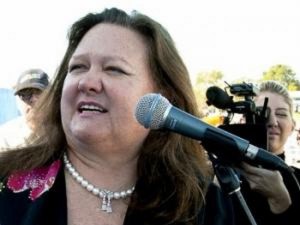Australia’s Fairfax snubs world’s richest woman
SYDNEY—Australian media group Fairfax Wednesday rejected a push for seats on its board by Gina Rinehart, its biggest shareholder and the world’s richest woman, citing editorial independence.
Rinehart, who has recently bought close to 19 percent in the prestigious newspaper, radio and online publishing group, had wanted three seats on the board of the company, which owns The Sydney Morning Herald and The Age.
“I regret that agreement has not been reached for Mrs. Rinehart to join the Fairfax Media board of directors,” chairman Roger Corbett said in a statement published by Fairfax’s Australian Financial Review.
“I hope that this might be possible in the future.
“However, key elements yet to be agreed include acceptance of the charter of editorial independence as it stands and the Fairfax board governance principles as agreed by all existing directors.”
Earlier, Fairfax chief executive Greg Hywood had said the company’s journalistic independence was “the core” of its business and board members could not tell journalists what to write.
“If you’re a board member editorial discussions are always held within board meetings,” he told the Australian Broadcasting Corp.
“What doesn’t happen is it doesn’t translate into board members telling journalists what they should or shouldn’t write, and that’s our practice.
“There’s been a lot of speculation around editorial independence in relation to Fairfax. That will always stay. That is the core of this company.”
Journalists at Fairfax, in the throes of a sweeping restructure set to cost 1,900 jobs, had called on Rinehart to respect its charter of independence after she boosted her shareholding.
Ahead of the Fairfax board meeting, Rinehart’s private company Hancock Prospecting released a statement saying it supported journalistic integrity but that Fairfax had overridden this principle in the past.
“We are certainly in support of journalist integrity and accuracy, these are important principles in journalism, and are keen to support an effective charter to endorse this in the interests of Fairfax Media, assuming one can be agreed,” the statement said.
Hancock’s chief development officer John Klepec also said two board seats were not enough to allow Rinehart — who holds no board seats despite her significant shareholding — to make Fairfax “sustainable”, the Herald reported.
Rinehart, the world’s richest woman, has said she hoped to be considered a “white knight” by Fairfax as it faces falling advertising revenues and newspaper circulation with readers switching to online platforms.
The Western Australia-based iron ore tycoon has hinted that she may sell her stake if she is not handed board seats at Fairfax.
The mining heiress, who is worth Aus$29.17 billion (US$29.35 billion) according to an annual index by Business Review Weekly, has been openly critical of Corbett, with the share price plunging more than 85 percent in the past five years.
The Australian media sector is enduring a turbulent period, with Fairfax and Rupert Murdoch’s News Limited both flagging large job cuts as they grapple with the challenges of digital transition.
Rinehart entered the media sector in late 2010, taking stakes in commercial television station Ten Network and in Fairfax which she has since built on.
